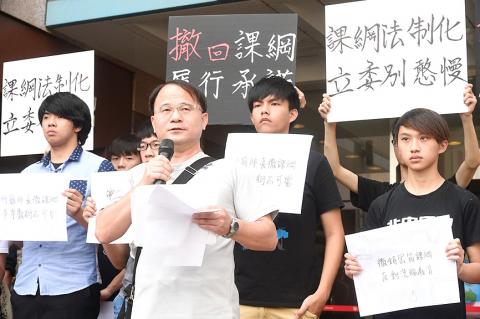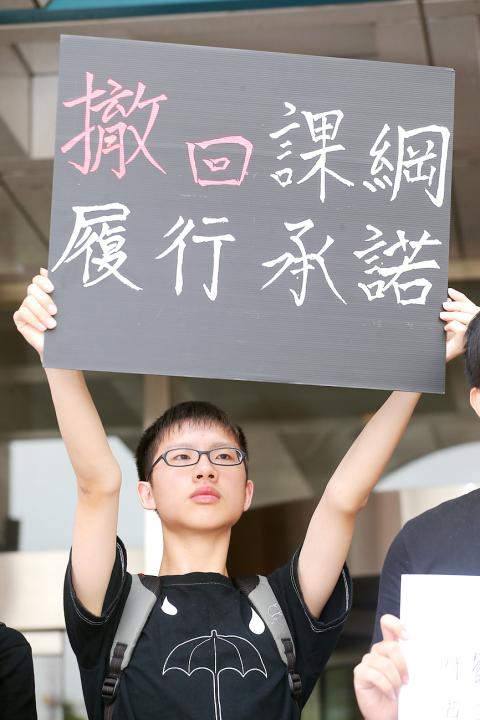Minister of education-designate Pan Wen-chung (潘文忠) should set a firm timeline for withdrawing controversial high-school curriculum guidelines, students said yesterday.
About 20 students protested in front of the Democratic Progressive Party’s (DPP) headquarters in Taipei, demanding that the DPP keep its promise to abolish the guidelines.
The allegedly China-centric focus and opaque approval process of last year’s “adjusted” guidelines sparked a student movement that saw the forecourt of the Ministry of Education compound in Taipei occupied by demonstrators.

Photo: George Tsorng, Taipei Times
“After winning the January elections, the DPP has only stated that it supports the students’ position. It has not promised to absolutely withdraw the guidelines after taking power on May 20,” Taipei Municipal Zhong-lun Senior High School student Lin Chih-yu (林致宇) said, adding that the DPP’s promises were in danger of becoming “feel-good” slogans.
Students said National Taiwan University social work professor Lin Wan-i (林萬億) — a top policy adviser to president-elect Tsai Ing-wen (蔡英文) — had promised them in December last year that the DPP would withdraw the guidelines should it win the elections.
Lin said he was concerned the DPP might backtrack after seeing it shift its position on the cross-strait trade in services agreement and related supervisory articles after January’s elections.

Photo: CNA
The DPP has drawn criticism for draft supervisory legislation that would exempt the trade in services agreement from new approval requirements, a key Sunflower movement demand.
Lin said premier-designate Lin Chuan’s (林全) comments that any decision on the guidelines would be up to Pan were another reason for concern, because Pan had been involved in their drafting in his previous role as administrative vice president of the National Academy for Educational Research.
Minister of Education Wu Se-hwa (吳思華) on Friday said Pan was personally responsible for overseeing the approval of the guidelines, which drew a sharp response from Pan, who said he was forced to relinquish oversight and withdraw from the process after having raised objections regarding procedures and the composition of the drafting committee.
“I was vice president of the National Academy for Educational Research at the time and I was supposed to oversee the development of curricula. However, I was relieved from the role because I was opposed to revisions of high-school curriculum guidelines, as the Ministry of Education did not make the revisions according to legal procedure and those who participated were not qualified to make the changes,” Pan said yesterday. “I was not involved in the process.”
Taiwan Grassroots Education Alliance member Chang Wen-lung (張文隆) said it was critical that Pan make his position clear, because teachers are in the process of choosing textbooks for the upcoming school year, with textbooks based on both the old and new guidelines available.
“If the minister-designate can make a clear statement that the guidelines will be abolished after May 20, it will be easy for teachers to choose,” he said. “As things stand, teachers are vacillating, because the government has not decided.”
In response, the DPP’s Department of Youth Affairs’ Huang Shou-ta (黃守達) said that withdrawing the controversial curriculum guidelines has always been the party’s official stance on the issue, adding that the DPP legislative caucus has proposed amendments to provide a legal framework for future changes to curriculum guidelines.
Last month, 65 DPP legislators proposed a motion demanding that the Executive Yuan and the ministry withdraw the adjustments to curriculum guidelines announced in February 2014.
“The proposal is now being negotiated between parties and could be voted on by Friday next week at the earliest,” he said.
The DPP caucus has also proposed amendments to the Senior High School Education Act (高級中等教育法) and the Primary and Junior High School Act (國民教育法) to make sure that curriculum guidelines will be decided in a professional manner, based on democratic principles and with the participation of the private sector, Huang said.
According to the proposed amendments, the ministry’s curriculum review committee is to be made a permanent organization instead of an ad hoc committee, with government representatives occupying less than one-fourth of seats on the committee, with the remainder filled by non-governmental representatives from educational institutions and groups recommended by the Legislative Yuan, Huang said.

ENDEAVOR MANTA: The ship is programmed to automatically return to its designated home port and would self-destruct if seized by another party The Endeavor Manta, Taiwan’s first military-specification uncrewed surface vehicle (USV) tailor-made to operate in the Taiwan Strait in a bid to bolster the nation’s asymmetric combat capabilities made its first appearance at Kaohsiung’s Singda Harbor yesterday. Taking inspiration from Ukraine’s navy, which is using USVs to force Russia’s Black Sea fleet to take shelter within its own ports, CSBC Taiwan (台灣國際造船) established a research and development unit on USVs last year, CSBC chairman Huang Cheng-hung (黃正弘) said. With the exception of the satellite guidance system and the outboard motors — which were purchased from foreign companies that were not affiliated with Chinese-funded

PERMIT REVOKED: The influencer at a news conference said the National Immigration Agency was infringing on human rights and persecuting Chinese spouses Chinese influencer “Yaya in Taiwan” (亞亞在台灣) yesterday evening voluntarily left Taiwan, despite saying yesterday morning that she had “no intention” of leaving after her residence permit was revoked over her comments on Taiwan being “unified” with China by military force. The Ministry of the Interior yesterday had said that it could forcibly deport the influencer at midnight, but was considering taking a more flexible approach and beginning procedures this morning. The influencer, whose given name is Liu Zhenya (劉振亞), departed on a 8:45pm flight from Taipei International Airport (Songshan airport) to Fuzhou, China. Liu held a news conference at the airport at 7pm,

Taiwan was ranked the fourth-safest country in the world with a score of 82.9, trailing only Andorra, the United Arab Emirates and Qatar in Numbeo’s Safety Index by Country report. Taiwan’s score improved by 0.1 points compared with last year’s mid-year report, which had Taiwan fourth with a score of 82.8. However, both scores were lower than in last year’s first review, when Taiwan scored 83.3, and are a long way from when Taiwan was named the second-safest country in the world in 2021, scoring 84.8. Taiwan ranked higher than Singapore in ninth with a score of 77.4 and Japan in 10th with

GRIDLOCK: The National Fire Agency’s Special Search and Rescue team is on standby to travel to the countries to help out with the rescue effort A powerful earthquake rocked Myanmar and neighboring Thailand yesterday, killing at least three people in Bangkok and burying dozens when a high-rise building under construction collapsed. Footage shared on social media from Myanmar’s second-largest city showed widespread destruction, raising fears that many were trapped under the rubble or killed. The magnitude 7.7 earthquake, with an epicenter near Mandalay in Myanmar, struck at midday and was followed by a strong magnitude 6.4 aftershock. The extent of death, injury and destruction — especially in Myanmar, which is embroiled in a civil war and where information is tightly controlled at the best of times —